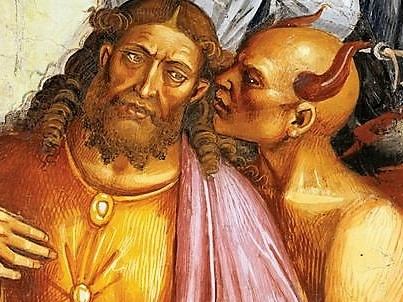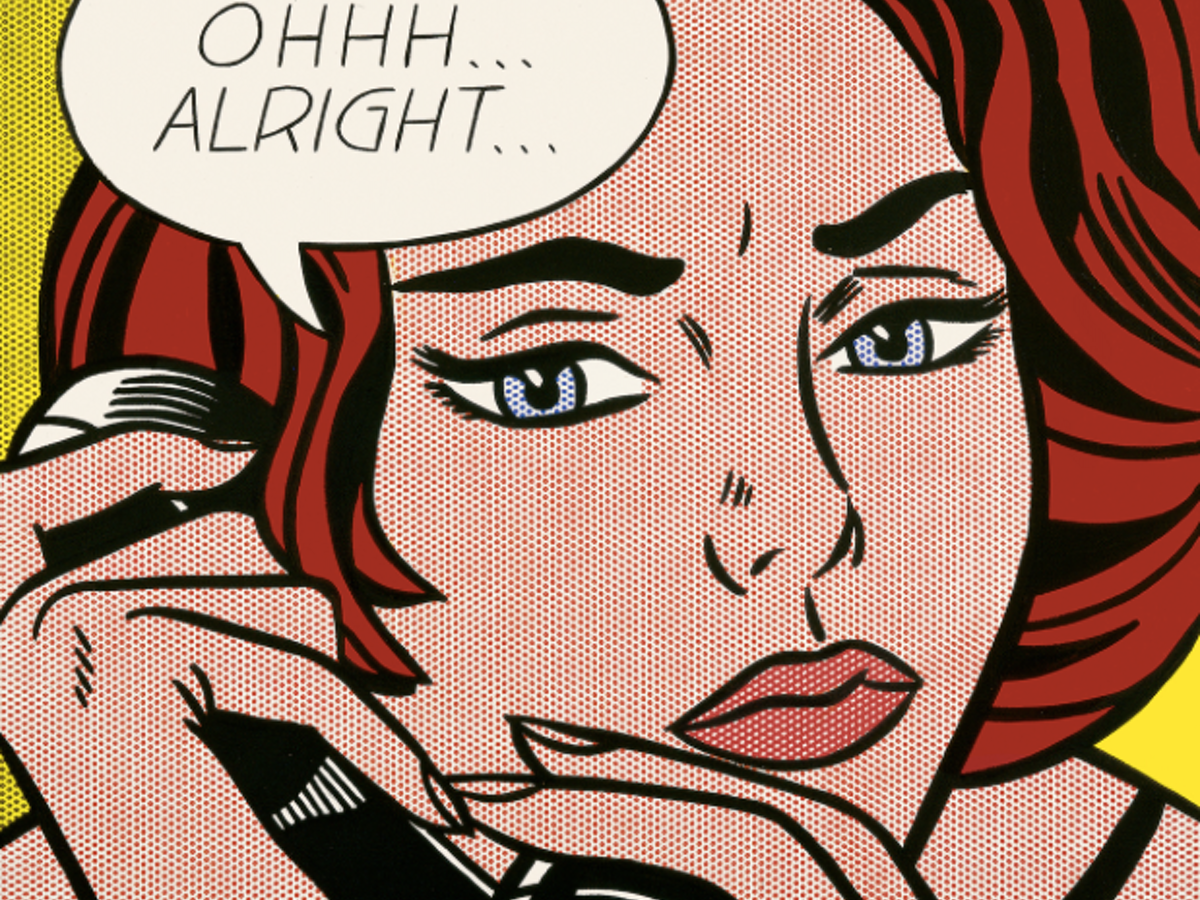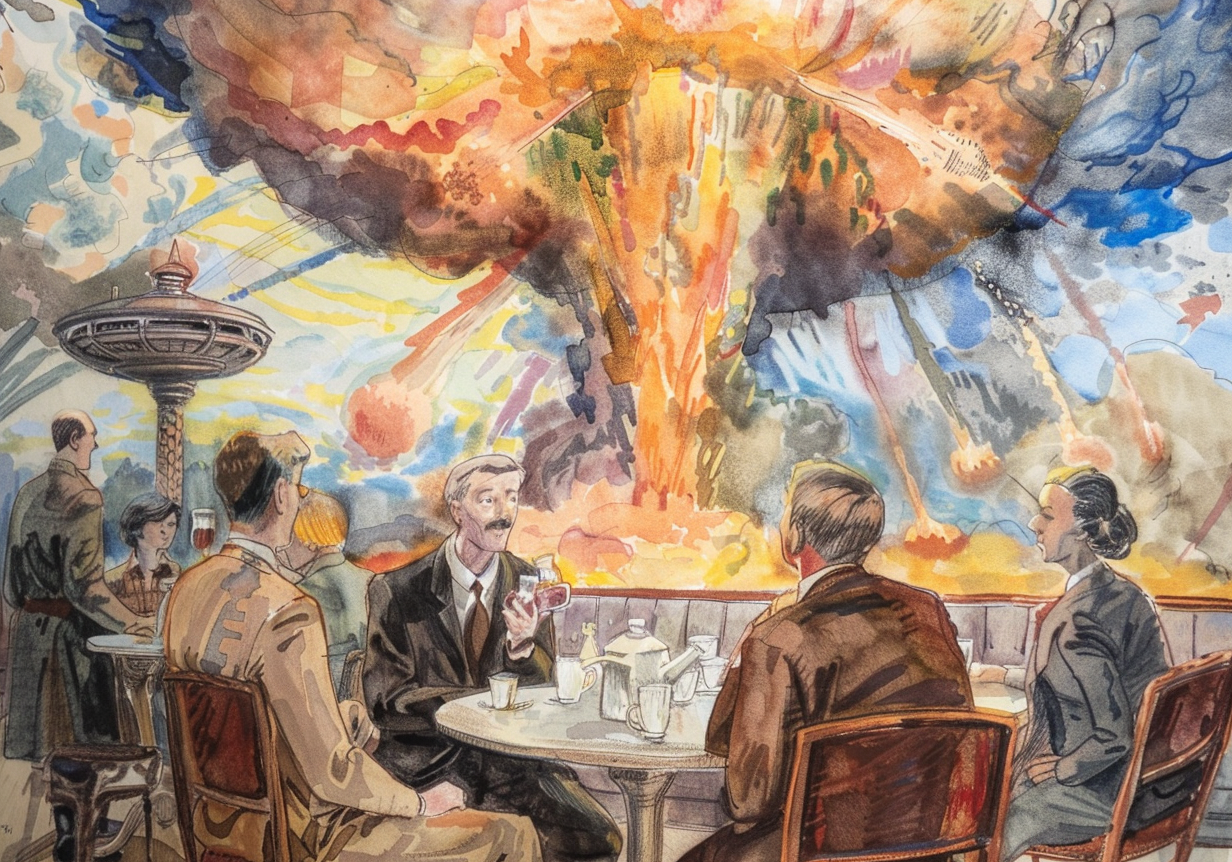Narrative and Metaverse
Part 2: Gain of Function
Why is it so difficult to see that there is an actual, physical world of thought where narratives live, and that these narratives can be diminished or enhanced by the metaverse-aware, just as viruses can be diminished or enhanced by the microverse-aware?


Nothing influences people more than a recommendation from a trusted friend. Mark Zuckerberg
As regular readers of Epsilon Theory know, I'm a dilettante farmer, meaning that my primary farming goal is really just to avoid injury (well, severe injury) as I act out the timeworn middle-aged white guy fantasy of driving a tractor and "working the land". So, yes, we have horses and sheep and goats, but they're pets, not livestock. Their meaning to me is aesthetic, not utilitarian, and I think of our flock of sheep, for example, as a living, mobile art installation.
My grandfather and namesake, who was a non-dilettante dairy farmer in North Alabama, would find my attitude towards these animals entirely alien and more than a little comical. Every animal on my grandfather's farm had a utilitarian purpose and meaning. Every animal's survival, literally whether or not they would be killed or allowed to live another day, was the result of a constant, unceasing, utilitarian cost-benefit analysis. That Ben Hunt, unlike this Ben Hunt, was in the business of farming, which requires thinking about animals in a very different way than dilettante farming.
Farmers or not, I believe it's fair to say that most people in the 1930s shared my grandfather's utilitarian thinking about animals, and I believe it's fair to say that most people today share mine. It's interesting to me that our society-wide thinking about animals has changed so dramatically in less than 100 years, and I believe it's because on a society-wide basis we have hidden away all of the billions of poultry and livestock animals that used to live among us.
Did you know that there are 75 million pigs and hogs kept as livestock in the United States? 75 million! I've never seen one of them. I see the shrink-wrapped chops and bacon and roasts every time I go to the grocery store, but I have never seen ONE of the 75 million alive-only-until-a-utilitarian-calculus-determines-they-will-be-slaughtered pigs and hogs.


About 9 billion chickens will be killed for food in the United States this year. Another 400 million or so will lay eggs for us. There are about 100 million cows alive today in the United States, and less than 10% of that total are dairy cows. More than 100,000 cows are killed to be eaten in the United States every day.


Out of sight, out of mind.
An ocean of shrink-wrapped animal flesh becomes the water in which we swim, invisible to conscious thought, much less consternation. And what a vast and well-priced ocean of shrink-wrapped animal flesh it is! ... oh-so democratically available as befits this, the best of all possible worlds. So vast that I cannot remember a single day of my life where I did not eat the flesh of another animal. So invisible that I cannot remember a single day of my life where I thought of it as eating the flesh of another animal.
We no longer think of animal-as-food because we no longer have the story of animal-as-food.
We no longer have any personal experience or knowledge of the animals we eat, because those billions of animals (billions!) have been intentionally sequestered and hidden away from us. More importantly we have no mediated or socially-shared linguistic experience (none at all!) with how the food we eat comes to us. This is intentional, as well.










Out of sight, out of mind factory farming is, in my view, dishonorable at best and horrific at worst. Since I didn’t grow up living with the animals my family consumed, I never thought much about where my meat came from, either. But now, the more I think about it, the more it feels wrong to not consider that. Also, what is the life of a cow or a pig like? I certainly don’t know. Perhaps I can reclaim some of that lost honor by buying from local, ethically-run farms.
Maybe I can also reclaim some of the lost honor (if you will) of my habitual consumption of engagement-driven content by interacting more locally. So far this week, I’ve spent hours thinking about arguments I’ve had with strangers on the internet and nearly zero hours thinking about or talking to anyone I know in real life, other than my wife.
As a fellow chicken owner, I see that even dino-brained creatures that we deny freedom to at least deserve a life with dignity and some grace, and that they suffer in the absence of those things. Becoming aware of the narrative controls I’m swimming in online affords me a little more dignity and a little more grace that I can offer to my fellow man as well as an impetus to spend less time online.
If you’ll indulge me, this poem captures what I’m getting at with the animals much better than I can say it:
The Weight
by Linda Gregg
Two horses were put together in the same paddock.
Night and day. In the night and in the day
wet from heat and the chill of the wind
on it. Muzzle to water, snorting, head swinging
and the taste of bay in the shadowed air.
The dignity of being. They slept that way,
knowing each other always.
Withers quivering for a moment,
fetlock and the proud rise at the base of the tail,
width of back. The volume of them, and each other’s weight.
Fences were nothing compared to that.
People were nothing. They slept standing,
their throats curved against the other’s rump.
They breathed against each other,
whinnied and stomped.
There are things they did that I do not know.
The privacy of them had a river in it.
Had our universe in it. And the way
its border looks back at us with its light.
This was finally their freedom.
The freedom an oak tree knows.
That is built at night by stars.
Wow. So – to use a popular culture reference – we’re Trill like Jadzia (from Star Trek: Deep Space Nine), with language (Dax) as our symbiont?? To quote another sci-fi work, I see the truth of it. So looking forward to part 3.
Thank you for this note, @vincevince, and Linda Gregg’s poem is a tour de force. Now if you’ll indulge me, here’s one by Jim Harrison …
Up on the Ft. Peck Reservation
(Assiniboine and Sioux)
just as I passed two white crosses
in the ditch I hit a fledgling meadowlark,
the slightest thunk against the car’s grille.
A mean minded God
in a mean minded machine, offering
another ghost to the void to join the two
white crosses stabbing upward in the insufferable
air. Wherever we go we do harm, forgiving
ourselves as wheels do cement for wearing
each other out. We set this house
on fire forgetting that we live within.
– Jim Harrison, To a Meadowlark (2008)
I’m the chicken, language is the egg shells. Big Media, Big Tech and Big Politics construct the egg shells with the correct curvature for my chicken brain, but at speeds my chicken brain can’t handle today.
Ben,
It has been said, only poets and comics get closest to the truth, using the tool of language. I would add a few wordsmiths too, exposing the narratives in the metaverse in which we swim.
If I could be so bold with a recent ditty.
“The I in me is the same as the Thy in thee”
Or, “The chicken (microbial organisms) in me are the same as the chicken (microbial organisms) in thee.”
No man is an island, except in our artificial political narrative.
Jim Handshaw
One “foodie” show I really appreciated was Vivian Howard’s “A Chef’s Life,” shot in and around Eastern North Carolina.
It did a great job of connecting what we eat to how it arrives on our table. Including a visit to a local hog farm during a slaughter.
Thanks for that recommendation, @AndyCats, I will definitely check it out!
I enjoyed this a great deal, Ben. I’ve long insisted that anybody who is against responsibly hunting for food and is not a vegetarian is an ignorant hypocrite. It also reminded me of the many Canadian seal hunters vilified by so-called animal rights groups (through the use of photos from the hunt) make the point that ‘we are punished because we’re not working behind closed doors like a slaughterhouse.’ I also have long felt that, as we are carnivores who do eat meat, it’s particularly dangerous that our understanding of killing and death comes mostly from video games, Hollywood movies and television shows (all of which are mechanisms that rewire our brains).
It also reminded me of the many Canadian seal hunters vilified by so-called animal rights groups (through the use of photos from the hunt) make the point that ‘we are punished because we’re not working behind closed doors like a slaughterhouse.’ I also have long felt that, as we are carnivores who do eat meat, it’s particularly dangerous that our understanding of killing and death comes mostly from video games, Hollywood movies and television shows (all of which are mechanisms that rewire our brains).
Modern society is so disconnected from the natural world that it has become easy to paint a false picture of what the natural world actually, in fact, is. Trying to get people see and know the truth about any mainstream topic (natural, political, scientific, whatever …) seems like a hopeless task, because you’re up against people and organizations who make a lot of money by convincing them of false notions and concepts that their human nature (fearful, unsure, seeking direction and comfort) makes them particularly vulnerable to absorbing even when it works directly against their own interests. It seems like the only way to compete with that with a model that enables making lots of money by promoting the actual truth. Is that possible?
I certainly hope that these notes will help make everybody think more about what makes them think the way they do and what kinds of steps can be taken to increase our autonomy of mind. Nice work!
I’ve hunted and fished since boyhood–and eaten what I’ve killed, so the connection between meat in the store and a formerly living creature has never been lost to me.
I do think it is very interesting that you can watch any number of hunting and fishing shows on TV and you will NEVER see them butchering their kills. Film the shot: yes! Butcher the animal: never! So, again, even in that corner of the metaverse, the connection between the living animal and the “protein” on the plate is lost. I guess the gore doesn’t sell nylons.
Snakes…
The other day, my youngest tried to ask me a question and threw me for a loop. He was trying to ask me a question related to why/how we think in language, but he didn’t have the right vocab set yet to formulate his question. I eventually teased out that he was trying to figure out how he “hears” his thoughts in his head without saying them. I thought that was cute and smart that he noticed. Then he hit me with one that stumped me. He asked how do animals think if they don’t have language.